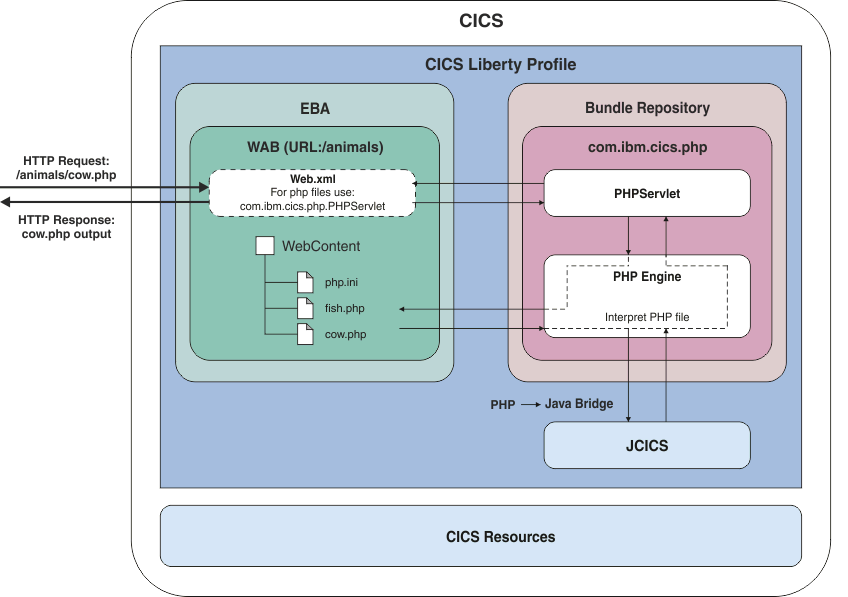CICS Transaction Server for z/OS Feature Pack for Dynamic Scripting V2.0
The CICS® Transaction Server for z/OS® Feature Pack for Dynamic Scripting V2.0 provides an agile web application platform for developing and running modern web applications. You can use the CICS TS Feature Pack for Dynamic Scripting V2.0 to create and run applications that meet your specific needs or the needs of your clients.
CICS TS Feature Pack for Dynamic Scripting V2.0 architecture
The CICS TS Feature Pack for Dynamic Scripting V2.0 is provided as a Liberty OSGi bundle that encapsulates the PHP engine, which is used to interpret PHP code, and a PHP servlet, for handling PHP file access.

The CICS TS Feature Pack for Dynamic Scripting V2.0 uses CICS to handle inbound HTTP requests and to provide security, statistics, and monitoring. It uses the Liberty JVM server runtime environment to perform Java™ processing, and a PHP engine to perform PHP processing. Functionally, the components of the Feature Pack are as follows:
- The Liberty JVM server provides a runtime environment for Java servlets and JSP applications, and includes an OSGi framework.
- The PHP runtime engine that runs the PHP code. Multiple applications can access the same engine.
- The PHP servlet manages access to the PHP files that are part
of the application. The PHP is served from a web OSGi bundle that
is deployed in an enterprise bundle archive (EBA) file.Note: An enterprise bundle archive (EBA) file contains a set of OSGi bundles that are deployed as a single OSGi application, and that are isolated from other OSGi applications. An EBA can include not only web applications, but can also contain other kinds of OSGi bundles. A web application bundle (WAB) is a web-enabled OSGi bundle project. It is an OSGi bundle version of a web archive (WAR) file.
- The PHP Java Bridge provides access to CICS resources through JCICS.
- You can run multiple PHP applications in one JVM server that has multi-thread capability.
- You can manage your PHP applications by using CICS BUNDLE resources. CICS controls the whole lifecycle of application.
- You can create composite applications that consist of PHP and Java EE functionality.
- Your applications inherit CICS and z/OS strengths, for example, runtime QoS, access control, ease of audit, and instrumentation.
- Your applications can use all of the functions and interfaces to external products that the Liberty JVM server supports. For more information about the CICS Liberty JVM server runtime environment, see JVM server runtime environment.
CICS TS Feature Pack for Dynamic Scripting V2.0 benefits
- Speed
- Productivity is increased by using reusable components and situational applications that require less time, fewer lines of code, and less specialized skill to produce.
- Development of web applications is made quicker and easier by using PHP.
- Deployment is simplified by a runtime environment that interfaces with CICS.
- Simplicity
- Dynamic scripting simplifies creating and deploying applications.
- Dynamic scripting enables developers to build applications by assembling existing services and feeds (from both internal and external sources) into composite situational applications.
- Agility
- Developers can build reusable building blocks, content, templates, and patterns, and reuse PHP content.